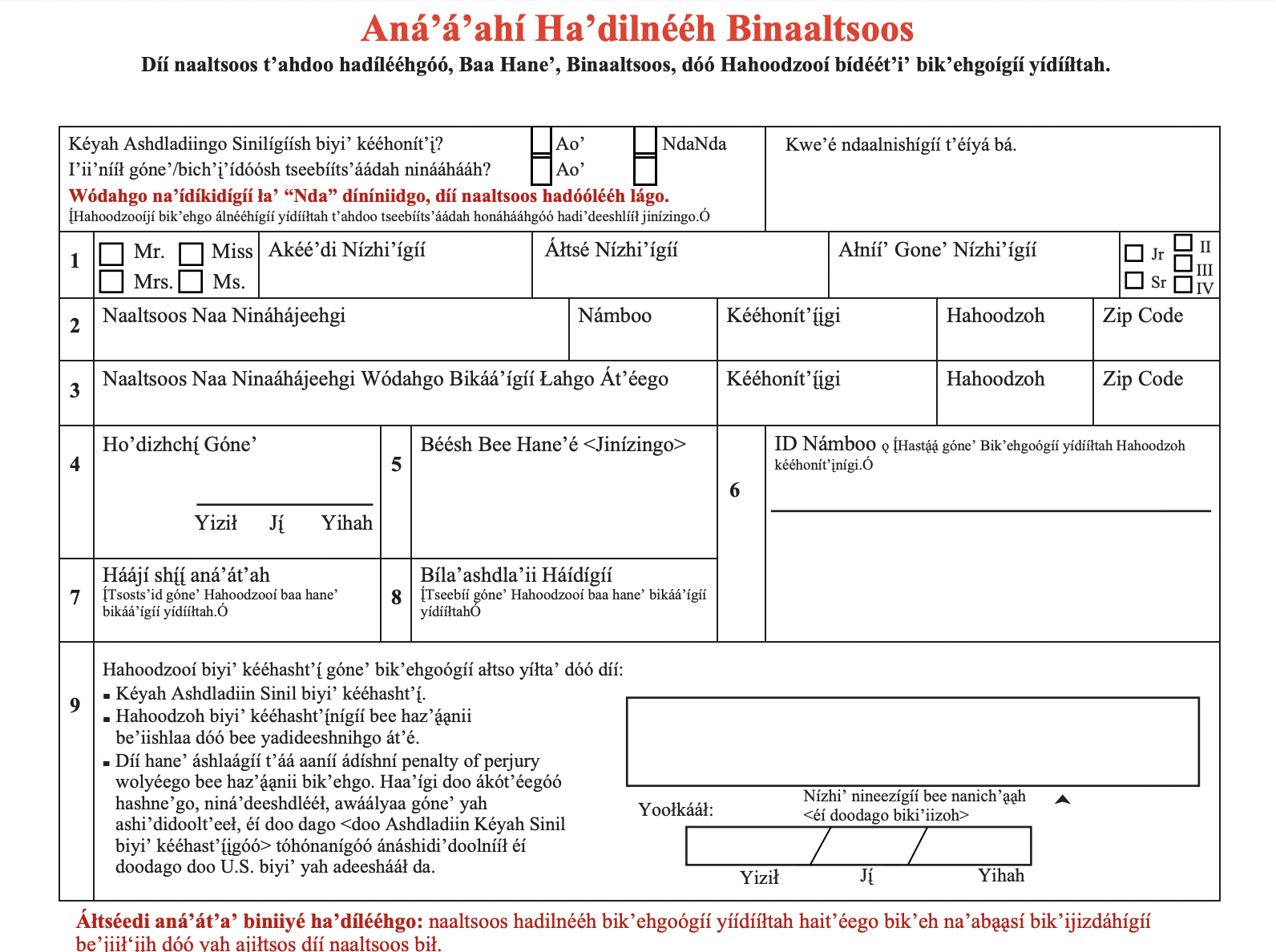
- Details
- By Jenna Kunze
A bipartisan government agency tasked with providing voting information to the public is working to make it easier for some Natives to vote.
This week, the agency— The US Election Assistance Commission (EAC)— released voter registration forms translated into three Native languages: Yup’ik, Navajo, and Apache. The Apache translation, a primarily spoken language, takes listeners through the National Mail Voter Registration Form in audio format only.
The announcement marks the commission’s first effort to expand voter registration access to Native American communities.The National Mail Voter Registration Form-- used to register U.S. citizens to vote, to update registration information and provide state-specific instructions - now exists in 21 languages.
Want more Native News? Get the free daily newsletter today.
Translations were provided by translators and speakers from each tribal community, according to the commission.
“The right to vote and understanding of the ballot is facilitated with the translation of ballots and related materials,” EAC Chairman Donald Palmer said in a statement to Native News Online. “The EAC will continue to identify ways to serve Native American communities across the nation.”
Samantha Mack, language assistance compliance manager at the Alaska Division of Elections, said in a statement that Alaska Native people, “deserve equitable access to all parts of the electoral process, and translating important forms and content into our Indigenous languages is an important step in that direction.”
Additionally, the EAC this week released a recent set of case studies and best practices on barriers that Native American communities face and how the agency plans to address them.
Barriers identified by the Native American Rights Fund include distance between remote home and polling places; lack of election information and outreach; a lack of physical addresses within reservation boundaries; technological barriers; and language access needs.
Statistics from the National Congress of American Indians show that only 66 percent of the eligible Native American voting population is registered to vote, and voter turnout of Native Americans is between 5 to 14 percentage points lower than other racial and ethnic groups.
Currently, Congress is considering the Native American Voting Rights Act, or NAVRA. Tribal leaders and Native organizations across the country are backing the legislation as the first step in reducing major barriers to Indigneous voters.
The law, originally introduced by Sen. Tom Udall (D-NM) in 2019 and reintroduced in August by Sen. Ben Ray Luján (D-NM), would allow tribes to specify the number and locations of requested voter registration sites and polling locations on their lands, authorize tribal ID cards for voting purposes, and authorize a $10 million task force grant program to establish Native American voting task forces in each state.
It would also require prior tribal notice and consent before states and precincts could remove or reduce access to voting locations on tribal lands.
In September, Cherokee Nation Chief Chuck Hoskin Jr wrote an op-ed for Native News Online encouraging Congress to swiftly pass the law.
“The cornerstone of our democracy is the right to vote. However, for most of our country’s history, Native Americans were denied that right,” he wrote. “To this day, barriers prevent Indian Country from fully making our voices heard and our votes count...Fortunately, new legislation recently introduced in Congress can fix many of these issues... At its core, NAVRA strengthens tribal sovereignty and self-determination over how to ensure everyone on tribal lands has access to the sacred right to vote.”
More Stories Like This
Q+A: Journalist Connie Walker Reflects on Season 3 of 'Stolen' Podcast Investigating Navajo Nation MMIP CasesNative Bidaské with Sarah Eagle Heart (Oglála Lakota) on the Indigenous Fashion Collective
Leona Carlyle-Kakar (Ak-Chin), Instrumental in Securing the 1st Water Rights Settlement in Indian Country, Walks On
California Moves Forward with Pilot MMIP Program
Native News Weekly (April 14, 2024): D.C. Briefs
Native Perspective. Native Voices. Native News.
We launched Native News Online because the mainstream media often overlooks news that is important is Native people. We believe that everyone in Indian Country deserves equal access to news and commentary pertaining to them, their relatives and their communities. That's why the story you’ve just finished was free — and we want to keep it that way, for all readers. We hope you'll consider making a donation to support our efforts so that we can continue publishing more stories that make a difference to Native people, whether they live on or off the reservation. Your donation will help us keep producing quality journalism and elevating Indigenous voices. Any contribution of any amount — big or small — gives us a better, stronger future and allows us to remain a force for change. Donate to Native News Online today and support independent Indigenous-centered journalism. Thank you.

